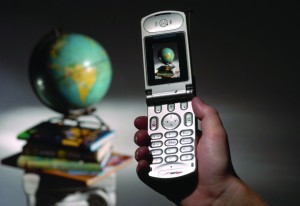By Lauren Kane –
“Put the cell phone away, please.”
Such words are a common phrase requested in the modern day classroom, as students are often caught with a having a cell phone in hand during class.
The moment of embarrassment soon passes, and class moves on.
Students continue to text in class and use their computers to browse FaceBook, when they should be taking notes.
Though teachers mention their technology policy in a syllabus, or at the start of the course, the Salve community has various reactions to the continued use of technology for not-so-scholarly uses.
Sister Madeleine Gregoire, an associate professor of the math department, has developed her own system of combatting cell phone distractions.
Starting in the 2011 Spring semester, Gregoire asks her students to give up their cell phones for the duration of class and place them at the desk in the front of the students’ respective row.
“I see a big change in the attention students are paying in class,” said Gregoire. “It’s just an automatic distraction.”
Some Salve Students agree with Gregoire:“I think it’s a good idea,” said Rachel Borba, a freshman in Gregoire’s Math 170 course. “ I see kids who decide to keep their cell phones, and they’re on it all the time.”
Dr. Soheyl Amini, a Sociology and Anthropology Department professor, utilizes the PBS video Digital Nation in his Introductory course to Sociology.
This video addresses students multitasking in the classroom, and offers statistics on whether or not students can truly learn and be constantly connected to both their teacher and the lessonwhile multitasking.
This documentary shows that multitasking, such as paying attention in class and texting friends, is nearly impossible to accomplish effectively.
The documentary follows a study conducted at Stanford University, the results of which prove that those who multitask complete their tasks significantly slower than those who work on things individually.
From the perspective of Salve students, technology is not a definite distraction for everyone.
“I think it all depends on the person,” said Alisia Medeiros, a freshman. “I wouldn’t go on FaceBook even if I could have my computer in class.”
Class size has an effect on the use of technology by Salve students.
Salve Regina University’s small class size makes students feel much more hesitant about deviating from the lesson to social networking during class.
“I would just feel bad,” said Nina Oria-Loureiro, a freshman.
Salve still doesn’t have a policy that punishes students for use of cell phones and computers for non-educational purposes. At the end of the day, students are responsible for their education, and while studies show we can’t multitask, it is our decision whether or not to make the effort.















